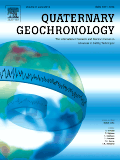
Quaternary Geochronology
metrics 2024
Innovating Methods to Date Geological Transformations.
Introduction
Quaternary Geochronology is a leading journal published by Elsevier Ltd, specializing in the field of Earth and Planetary Sciences. With a strong emphasis on the geochronological methods and techniques used to date geological materials from the Quaternary period, this prestigious journal serves as a critical platform for disseminating significant research findings, theoretical advancements, and comprehensive reviews relevant to the stratigraphic and geological sciences. Since its inception in 2006, the journal has garnered an impressive impact factor, positioning itself in the Q1 category for its excellence in Earth and Planetary Sciences, Geology, and Stratigraphy. Quaternary Geochronology currently ranks #11 out of 55 in Stratigraphy, #74 out of 321 in Geology, and maintains a high standing across various related fields. Researchers, professionals, and students are encouraged to explore its rich archives and current issues for the latest trends, methodologies, and findings that shape our understanding of Quaternary environments. The journal does not operate under an open-access model, ensuring that high-quality peer-reviewed research is accessible while maintaining rigorous academic standards.
Metrics 2024
 0.81
0.81 1.70
1.70 2.00
2.00 79
79Metrics History
Rank 2024
Scopus
IF (Web Of Science)
JCI (Web Of Science)
Quartile History
Similar Journals
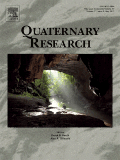
QUATERNARY RESEARCH
Illuminating Interdisciplinary Insights into Earth's Recent Changes.QUATERNARY RESEARCH, published by Cambridge University Press, is a leading academic journal that focuses on the study of the Quaternary Period, the most recent geological time period. With a strong emphasis on interdisciplinary research, the journal has significantly contributed to our understanding of Earth's dynamic systems and processes, making it an essential resource for researchers and professionals in the fields of Earth and Planetary Sciences, Earth-Surface Processes, and the Arts and Humanities. It is recognized for its high-impact contributions, reflected in its impressive Q1 rankings across multiple categories, including its position as 69th out of 552 in Arts and Humanities and 49th out of 195 in General Earth and Planetary Sciences, showcasing its influence and relevance in the academic community. While QUATERNARY RESEARCH does not provide open access options, it remains a crucial platform for disseminating valuable research findings and fostering scholarly dialogue. The journal's coverage spans from 1970 to 2024, serving as a comprehensive archive of key developments in the field.

INTERNATIONAL JOURNAL OF EARTH SCIENCES
Illuminating Climate Change and Planetary DynamicsINTERNATIONAL JOURNAL OF EARTH SCIENCES, published by Springer, is a leading journal in the field of Earth and Planetary Sciences, distinguished by its Q1 quartile ranking in the 2023 category of Earth and Planetary Sciences (miscellaneous). With an ISSN of 1437-3254 and an E-ISSN of 1437-3262, this journal has been a pivotal platform for researchers, academics, and practitioners since its inception in 1996. The journal's focus encompasses a broad range of topics within Earth sciences, making it a vital resource for contributions that enhance our understanding of geological processes, climate change, and planetary dynamics. The impact factor reflects its high standards and the significance of the research it publishes, ranking it in the 74th percentile among its peers as per Scopus. Furthermore, the journal offers Open Access options, facilitating the global dissemination of groundbreaking research. The editorial team is committed to advancing knowledge in Earth sciences, serving as an essential reference for students and professionals looking to engage deeply with this dynamic field.
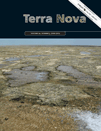
TERRA NOVA
Advancing Knowledge in Earth SciencesTERRA NOVA, published by WILEY, is a leading journal in the field of Geology, with a remarkable impact within the academic community. With the ISSN 0954-4879 and E-ISSN 1365-3121, the journal has been a pivotal platform for innovative research since its inception in 1989 and will continue its influence through to 2024. Ranked in the top tier (Q1) of its category for 2023, TERRA NOVA holds an esteemed position with a Scopus ranking of 67 out of 321 in Earth and Planetary Sciences, showcasing its dedication to high-quality, impactful scientific discourse. The journal covers a diverse range of topics within geology, providing valuable insights for environmental scientists, geologists, and industry professionals. By fostering an interdisciplinary approach, TERRA NOVA remains committed to advancing the understanding of geological processes and their implications for society. With a dedicated readership of researchers, professionals, and students, this journal is essential for those looking to stay abreast of the latest developments and trends in the field.
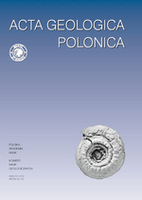
ACTA GEOLOGICA POLONICA
Connecting researchers to the forefront of geological research.ACTA GEOLOGICA POLONICA is a distinguished journal published by the Polska Akademia Nauk, in collaboration with the University of Warsaw's Geology Department. Since its inception, it has served as a vital platform for disseminating innovative research in the field of Geology, reflecting a commitment to advancing scientific knowledge in Earth and planetary sciences. With an ISSN of 0001-5709 and an E-ISSN of 2300-1887, this journal provides a rigorous review process and is classified in the Q3 quartile for Geology as of 2023, indicating its growing influence in the discipline. Despite not being open access, the journal facilitates meaningful contributions that span a range of geological topics from fundamental research to applied sciences, thereby enriching the academic landscape. Researchers, professionals, and students alike are encouraged to engage with the valuable findings and discussions contained within its pages, which continue to shape the future of geological inquiry.

GEOLOGICAL QUARTERLY
Connecting Minds in Earth Sciences Since 2000.GEOLOGICAL QUARTERLY, published by the Polish Geological Institute, is a respected journal in the field of geology, offering insights into Earth and planetary sciences since its inception in 2000. With an ISSN of 1641-7291 and an E-ISSN of 2082-5099, this journal serves as a vital platform for researchers, professionals, and students seeking to expand their knowledge in geological disciplines. The journal is positioned in Q3 within the geology category as of 2023 and ranks #172 out of 321 in Scopus, placing it in the 46th percentile among its peers. Although currently not an open-access publication, GEOLOGICAL QUARTERLY reflects the policy of fostering scientific communication and collaboration by disseminating valuable geological research. Its commitment to publishing original articles, reviews, and technical notes ensures that it plays a significant role in advancing geological science and its applications within the academic community. With its base in Warsaw, Poland, the journal stands as an important resource for anyone engaged in or studying the Earth sciences.

Quaternary
Advancing Knowledge in Quaternary ScienceQuaternary is a dynamic academic journal that focuses on the intricate and evolving field of Earth and Planetary Sciences, with particular emphasis on Earth-Surface Processes. Published by MDPI, a globally recognized and reputable publisher based in Switzerland, Quaternary has established itself as a vital resource since its inception in 2018. The journal has successfully transitioned to an Open Access model since 2019, ensuring that groundbreaking research is readily accessible to a global audience. With a commendable impact factor reflected in its quartile ranks—Q2 in both Earth and Planetary Sciences (miscellaneous) and Earth-Surface Processes—it ranks comfortably within the top 40% of its field, making it an invaluable platform for sharing innovative research and insights. The journal promotes interdisciplinary collaboration and is committed to advancing our understanding of Quaternary science through high-quality publications that appeal to researchers, professionals, and students alike. Positioned as a significant player in its domain, Quaternary continues to foster discussions that shape the future of Earth sciences.
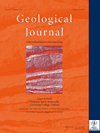
GEOLOGICAL JOURNAL
Connecting disciplines to deepen our geological understanding.GEOLOGICAL JOURNAL, an esteemed publication by WILEY, has been at the forefront of geological research since its inception in 1951. With an ISSN of 0072-1050 and E-ISSN of 1099-1034, this journal serves as a vital platform for disseminating high-quality, peer-reviewed research in the field of geology. Operating out of the United Kingdom, the journal proudly features a Scopus rank of 80 out of 321 in the Earth and Planetary Sciences category, reflecting its commitment to scholarly excellence, with a 2023 category quartile ranking of Q2. As part of its innovative approach, GEOLOGICAL JOURNAL seeks to foster interdisciplinary collaborations, advancing our understanding of earth processes, materials, and history. Although it does not offer open access options, its robust subscription model ensures that both professionals and students have access to groundbreaking insights. With a publication history that spans over seven decades, the GEOLOGICAL JOURNAL continues to be an indispensable resource for the global geological community, encouraging discoveries that shape our comprehension of the planet.
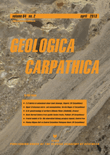
GEOLOGICA CARPATHICA
Advancing Knowledge in Geology and BeyondGEOLOGICA CARPATHICA, with ISSN 1335-0552 and E-ISSN 1336-8052, is a distinguished open access journal published by the Slovak Academy of Sciences Geological Institute, serving as a pivotal platform for the dissemination of research in the field of Geology. Established in 1991 and continuing through 2024, the journal is recognized for its significant contributions to Earth and Planetary Sciences, evidenced by its 2023 Scopus ranking placing it in the second quartile (Q2) within Geology. With an H-index that showcases its impactful publications, GEOLOGICA CARPATHICA is committed to fostering scholarly communication while promoting accessible research, having adopted an open access model since 2009. Located in beautiful Bratislava, Slovakia, this journal aims to engage a global audience of researchers, professionals, and students interested in ecological, geological, and environmental studies, making it a prominent resource for enriching the scientific community's understanding of the Carpathian region and beyond.
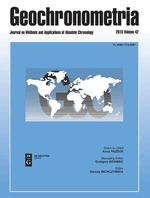
Geochronometria
Illuminating the Past through Radiometric DatingGeochronometria is a renowned journal dedicated to the field of Earth and Planetary Sciences, published by SCIENDO in Germany. With a history spanning over two decades since its inception in 2000, it has established itself as a key platform for disseminating innovative research and methodologies in geochronology, radiometric dating, and related disciplines. Currently, it holds a respectable Q2 ranking in the subject area, showcasing its relevance and influence, particularly with a Scopus rank of #92 out of 159 journals in Earth and Planetary Sciences, which places it in the 42nd percentile. This journal is committed to facilitating open discussions and advances in understanding geological time scales and processes, making it an essential resource for researchers, professionals, and students alike. Although it is not an open-access journal, its significant contributions to the scientific community underscore its pivotal role in advancing knowledge within the field.
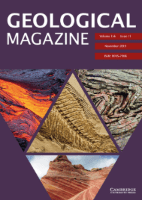
GEOLOGICAL MAGAZINE
Pioneering Discoveries in Earth and Planetary SciencesGEOLOGICAL MAGAZINE, published by Cambridge University Press, is a premier journal in the field of geology, renowned for its rich legacy since 1864 and ongoing contributions to Earth and Planetary Sciences. With an impressive Q1 ranking in Geology and a Scopus rank of #70 out of 321 journals, it holds a significant position within the academic community, appealing to researchers, professionals, and students alike. The journal covers a wide array of topics, ensuring a comprehensive platform for the dissemination of cutting-edge geological research. Although it does not offer open access, it remains a vital resource for those seeking to stay abreast of advancements in the field. With an enduring commitment to quality, GEOLOGICAL MAGAZINE stands as an essential outlet for scholarly communication and serves as a catalyst for academic discourse within the geological sciences.